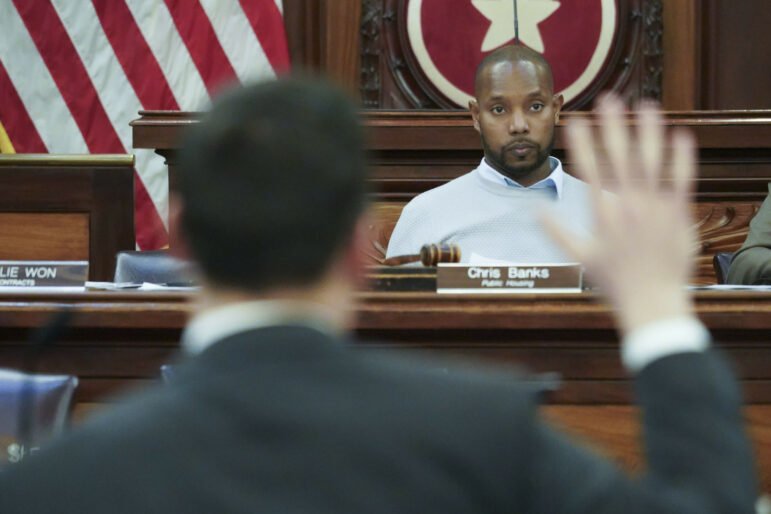Al D’Amato, the man who won his last Senate race by tattooing “hopelessly liberal” onto poor Bob Abrams’ blank-slate pate, found himself surrounded in a dangerously enclosed space last spring. Actually, it was D’Amato who had summoned the small platoon of hardened liberal tenant leaders to his D.C. inner sanctum. The Junior Senator was furious.
In an attempt to pull him into the rent wars raging in Albany, the state Democratic party and the tenant groups had been broadcasting a TV ad portraying the three-term senator from Long Island and his protégé, Governor George Pataki, as radical conservatives intent on kicking a million New York City tenants out of their apartments.
D’Amato started off with the DeNiro-as-Capone routine. “Are you trying to fuck me?” And then he waited for the reaction.
There was none.
“He was trying to intimidate us. He was being a real prick,” recalls a former tenant lobbyist who attended the meeting. “But we didn’t mind. That’s what he does. He was trying to feel us out, see how far he could get with us. With D’Amato you know what you’re getting–it’s a totally political agenda.”
In the weeks following the meeting, D’Amato proceeded to do much of what they had asked. The senator boosted his profile in the rent control battle and, to the chagrin of his conservative supporters, opened his own back-door negotiations with state Democratic leaders. D’Amato deftly cut the ground out from underneath conservative state Senate Majority Leader Joe Bruno’s feet and helped convince Pataki to accept a compromise.
D’Amato’s behavior was based on a single political objective: to convince people who despise him to hate him just a little bit less. As far as he’s concerned, it’s OK if most New York City Democrats regard him as an asp in Florsheims. But he won’t allow their disdain to grow to the point where Dems unite in an all-out effort to beat him. And he certainly doesn’t mind if they suspect that somewhere beneath that Right-To-Life lapel pin beats a secret liberal’s heart.
“I believe he played a major role in the final deal,” says Billy Easton, lobbyist for the New York State Tenants and Neighbors Coalition, a top tenant group. Easton’s organization, which had been behind some of the anti-D’Amato commercials, shifted gears following the victory and featured D’Amato on the cover of its newsletter.
“By continuing to do the right thing on housing, he’s effectively neutralized his tenant opposition,”
Easton admits now. “You saw those TV ads last year. You won’t see them again this year. We have nothing to gain and lots to lose.”
Easton is nothing if not brave. Progressive policymakers, activists and lobbyists demanded anonymity when they told City Limits they felt the same way about the senator after he fixed their pet potholes. D’Amato may profess to disdain liberals in campaign ads, they say, but he helps them mightily in private.
And that bodes ill for the senator’s Democratic opponents. There are no spontaneous uprisings in politics. So his challenger will need liberal opinion leaders to organize their constituencies–tenants, union members,
activists, freelance liberals–into an army to vanquish D’Amato, who will probably amass a three-to-one cash
advantage against them
“I would never say this to anybody–so God, don’t put my name on this–but I have a lot of affection for Al D’Amato,” says a lefty Washington-based housing lobbyist who worked closely with the senator and his staff for years–and watched as D’Amato maneuvered the defeat of right-wing public housing legislation proposed by fellow congressional Republicans. “I hope no one figures out I said this.”
_______
After he anointed George Pataki as his party’s gubernatorial candidate in 1994, Al D’Amato could make his claim as King Bee in a state of political gnats. But as he approaches his own race this November, D ‘Amato has the misfortune of being a powerful populist without a permanent plurality. To endure, therefore, D’Amato must endear. “When push comes to shove, 45 percent of the voters hate him, 45 percent like him and 10 percent are open to persuasion,” says a top aide to one of D’Amato’s would-be Democratic challengers. “No matter what he does, those numbers stay basically the same. That’s why he needs to be so aggressive in wooing people who don’t like him.”
Mostly, those people are New York City Democrats. Bob Abrams, the former attorney general who came out of the 1992 Democratic primary bruised and broke, only missed upending D’Amato by 81,000 votes–which translates into one thin percentage point. And in the city, Abrams walloped the senator by a half million votes.
This basic calculus hasn’t changed. According to a recent Quinnipiac College poll, former Veep candidate Geraldine Ferraro would wipe out D’Amato 52 to 38 percent and Public Advocate Mark Green would win by six points. The senator barely edges out Brooklyn Congressman Chuck Schumer.
For the D ‘Amato camp, the good news is his approval rating is as high as it has been since 1994. The bad news is it’s still only 43 percent.
“Al’s got to get his numbers up in the city,” says Democratic consultant Norman Adler. “He’s in as weak a position as he has ever been going into an election year.”
To any other pol, such low numbers would be devastating. After all, D’Amato’s been aggressive in his effort to reach out to new voters. In what was widely perceived to be a masterstroke, he ran a series of TV ads with female family members to help push for the state’s environmental bond act. He has also picked up on the breast cancer issue on Long Island. “He needs to do this stuff. He’s so weak among women,” says Republican political consultant Joseph Mercurio.
D’Amato has been even more successful shoring up other weaknesses. He has practically worn a groove in his scalp from slamming a yarmulke on and off, courting the state’s historically left-leaning Jews to an extent no self-avowed conservative has ever done before. He netted 41 percent of the Jewish vote statewide six years ago; that number might be higher this time around after his well-publicized efforts to recover Swiss-held gold Nazis stole from Jews during World War II. “It was a brave political stand, risking all those Swiss votes like that,” says pollster John Zogby, a friend of D’Amato’s. “In Jewish houses, right next to Elijah’s cup, they’re going to put Al’s cup,” adds a Democratic strategist.
But that won’t be enough. To assure he won’t lose, D’Amato needs to avoid making new enemies. In the rent control battle, D ‘Amato made sure his staff kept the lines of communication open with tenant leaders–even after they picketed his girlfriend’s Upper East Side apartment building.
D’Amato watchers say the first real inkling they had that he was targeting the Left came in 1993, when he unexpectedly backed Bill Clinton’s effort to allow gays in the military–a move that earned him brickbats from GOP allies. “[D’Amato] is to the left of Clinton on this issue,” John Kassar, chairman of the Brooklyn Conservative Party said at the time. “We feel betrayed.”
But his most significant entreaties to liberals have been of the backroom variety.
When the GOP grabbed both houses of Congress four years ago, D’Amato took maximum advantage–not to punish his enemies, but to deal them into his newly-won largesse. He is a master of the fundamental, political task of wielding power to deliver for the folks back home, whoever they might be. “No matter what he espouses philosophically, he is the liberal of all liberals when it comes to the big government thing,” adds Zogby.
_______
Since 1997, D’Amato has used his pull to dampen the opposition of one of his most dangerous natural enemies, hospital union boss Dennis Rivera, the energetic Puerto Rican leader who controls one of the city’s most powerful get-out-the-vote operations.
Hint of a D’Amato-Rivera entente emerged last summer when D’Amato helped secure $1.25 billion in federal money to help hospitals–and workers at Rivera’s Local 1199–deal with the potentially jarring move into Medicaid managed care.
This year, D’Amato and Rivera have worked on an issue even closer to home for the union. For years, 1199 has been battling management at Bed-Stuy’s crumbling, debt-ridden Interfaith Medical Center. At Rivera’s prodding, the senator strong-armed Pataki to release $150 million in State Dormitory authority bonds to rebuild the hospital and add three primary care centers–a deal Pataki was reportedly loathe to pursue. But D’Amato’s personal appeals prevailed. The senator helped preserve 1,500 jobs and shored up a hospital in a Democratic stronghold where, not incidently, roughly one-third of 1199’s members live. D’Amato told the New York Times upon closing the deal, “What is the sense of [having] the best if it only goes to a privileged few?”
Publicly, Rivera will probably endorse and, to some extent, bankroll the political operations of D’Amato’s Democratic opponents. But neither he, nor the members whose jobs D’Amato helped save, are much inclined to launch an anti-Al crusade–even if the senator’s support of welfare reform has harmed a lot of people in Central Brooklyn. “D’Amato will never get our endorsement, but he’s achieved a significant victory if he gets Dennis not to work too hard to defeat him,” says a source close to Rivera. And that, the source says, is a likely bet: “D’Amato has done everything the hospitals and the union have asked him to do…. Al and Dennis have a purely business relationship. It’s a matter of Dennis saying to himself: Do I support someone whose goals I agree with, or do I support a guy whose busting his ass for me even if I know he’s a pig?”
_______
D’Amato has also quietly endeared himself to the hardest of all hardcore low-income Democratic constituencies: public housing residents and their advocates.
In addition to lobbying against the elimination of HUD and further cuts to the Section 8 rent subsidy program, he has quietly played a pivotal role blocking a young Long Island Republican Congressman’s attempt to hammer through a conservative public housing bill that would hike rents for the poor and raise the income levels permitted in the projects. Congressional staff and advocates tell City Limits that D’Amato, again at the behest of liberal lobbyists, effectively blocked Congressman Rick Lazio’s bill, even though it had the enthusiastic support of Mayor Giuliani–and the backing of D’Amato’s potential Democratic opponent Charles Schumer.
D’Amato has his own more moderate proposal which is still being mulled by a Senate-House conference committee. But behind the scenes, D’Amato reportedly has been skeptical about passing anything at all.
“The main thing he told his staff was that he didn’t want anything crazy coming out of his committee when it came to public housing,” says a prominent housing lobbyist, who like so many others requested anonymity for fear of being labeled pro-D’Amato. “Only bad things could come out of the process for him. If it passes, some people back home will be pissed off.”
As the housing stalemate grinds into its third year, the relationship between Lazio and D’Amato has reportedly deteriorated from cool to barely-speaking terms.
Still, there’s no denying that by the numbers, D’Amato really does live up to his conservative self-billing. He is anti-abortion. He was one of the lustiest proponents of welfare reform. His love for government pork is exceeded only by his hatred for taxes. His environmental record has improved with his support of the Environmental Bond Act–simply because it couldn’t get much lower than the “0” ranking the League of Conservation Voters gave him two years ago. And don’t forget that his campaign’s brain is lodged in the right-wing skull of consultant Arthur Finkelstein, the man who coined “liberal” as a slur and whose highest profile client is Bibi Netanyahu.
D’Amato’s overall voting record, according to the centrist National Journal, has actually gotten a little more conservative over the last few years.
Trying to reconcile his official record with his backroom friendship with the left is a little jarring. It might also be a civics lesson. “Are we trying to imply he’s being responsible to an intelligent electorate?” asks Republican consultant Mercurio. “Oh God, that would be an awful thing to admit.”
The strategy may succeed come election day if the two D’Amatos are never forced to face each other–in, say, a mirror.
“Quite frankly, I know he hasn’t been with us on every issue,” says Mile Long, a Brooklyn wine store owner who runs the New York State Conservative Party. “He’s not the most conservative member of the U.S. Senate, but I can live with it.”
Democratic opponents put it another way: “Who the hell knows what he really believes?” says Washington- based pollster Donna Victoria, who frequently works New York races. “Who the hell cares?
The question is, how are his opponents going to go after him when he’s taking away most of their issues?”
And how do you go after him when he’s so good at going after every single vote he can get his hands on?
_______
Late one night about five years ago, pollster John Zogby was just dozing off when he was jolted awake by a call from a friend. The man, a Palestinian-American businessman who hated D’Amato for his hard pro-Israel line, was nearly hysterical.
His young son, a photographer with a French news agency, had been arrested by Israeli security forces for taking pictures of West Bank riots. The kid, Zogby’s friend explained, was being held incommunicado. His camera had been smashed.
“I’ll call D’Amato,” Zogby offered.
There was a silence, then an eruption on the other end of the line. “Are you out of your mind? D’Amato loves Israel. He hates Arabs.”
Undeterred, Zogby called D’Amato. Twelve hours later, the boy was on a plane back to the states.
The businessman, who still resents D’Amato’s pro-Israel stance, now votes for him, recruits his friends to do the same and even doles out the occasional campaign offering.
Four-and-a-half years have passed. One recent day, the businessman came home from work to find an envelope in the mailbox from D’Amato’s office. He tore it open and discovered it contained a $500 check issued by the Israeli consulate. Puzzled, he read the enclosed letter explaining that it was meant to cover the cost of the smashed camera.
It was signed “Al D’Amato, U.S. Senator.”








